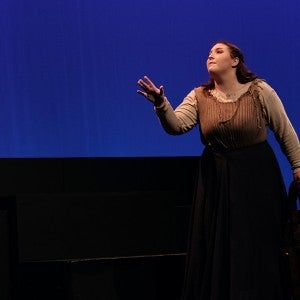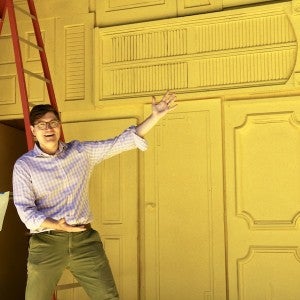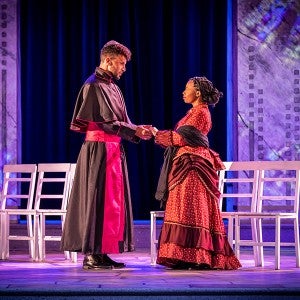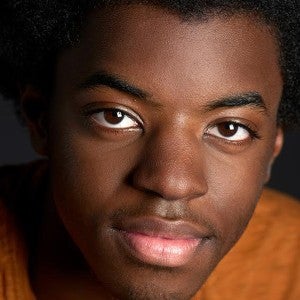For good: Interlochen alumni reflect on the 20th anniversary of ‘Wicked’
From Laurel Harris as Elphaba to Jaime Rosenstein as Nessarose, former Broadway and national tour cast members share their memories of the Tony Award-winning musical.
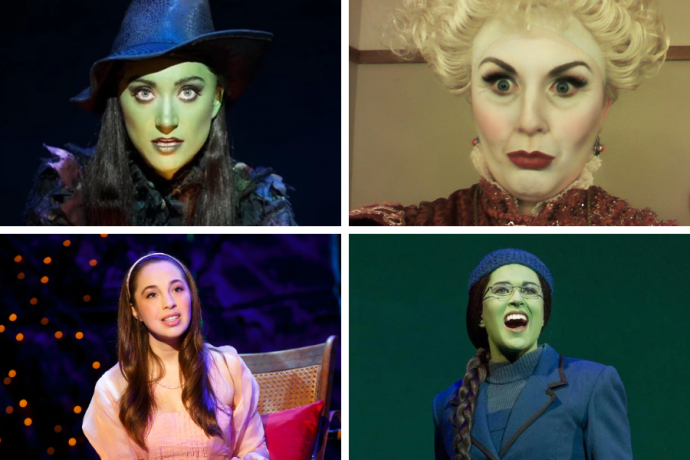
Top row, L-R: Laurel Harris as Elphaba, Sheila Karls as Madame Morrible. Bottom row, L-R: Jaime Rosenstein as Nessarose, Carla Stickler as Elphaba. Photos of Harris, Rosenstein, and Stickler by Joan Marcus.
In October 2003, audiences at the Gershwin Theatre in New York City heard Stephen Schwartz’s now-iconic lyrics to “For Good” for the very first time:
“Who can say if I’ve been changed for the better? But, because I knew you, I have been changed for good.”
Just as its two heroines were forever shaped by their unlikely friendship, Wicked has left an indelible mark on both Broadway and on audiences around the world. The musical has shattered box office records, earned three Tony Awards, captured the 2004 Grammy Award for Best Musical Theatre Show Album, inspired a forthcoming film adaptation, and captivated legions of devoted fans. Two decades after its opening night on Oct. 30, 2003, the “cultural phenomenon” (Variety) has been seen by more than 30 million people worldwide and surpassed Andrew Lloyd Webber’s Cats as the fourth longest-running show in Broadway history.
Beyond its monumental cultural impact, Wicked has also given hundreds of theatre performers, technicians, and pit orchestra musicians a chance to fly—including more than a dozen Interlochen Arts Camp and Arts Academy alumni:
- Kate Fahrner (AS 98), Glinda, Broadway and National Tour casts
- Ana Gasteyer (IAC/NMC 79, 81), Elphaba, Broadway cast
- Tiffany Haas (IAC 93), Glinda, Broadway and National Tour casts
- Laurel Harris (IAC 01, AS 02), Elphaba, Broadway and National Tour casts
- Jeffrey Irving (IAA 92-96, IAC St 96, IAC Fac 11-23), percussion, Broadway pit
- Sheila Karls (IAC 02, IAA 02-04), Madame Morrible and others, National Tour
- Emily Koch (IAC 06-07, IAA 07-09), Elphaba, Broadway and National Tour casts
- Chelsea Krombach (IAC 98), Elphaba and others, Broadway and National Tour casts
- Logan Lipton (AS 97-98, IAA 98-99), Boq, Broadway and National Tour casts
- Elizabeth Lohr (IAA 75-79), stage manager, National Tour
- Kristen Martin (IAC 96, 98-99; IAA 00-01), Nessarose, Broadway and National Tour casts
- A. Graydon McGrannahan IV (IAC 95-96), trombone, National Tour pit
- Brynn O'Malley (AS 93-98, IAC St 99), Nessarose, Broadway cast
- Theodore Primis (IAC 92, IAA 92-94), horn, Broadway pit
- Jaime Rosenstein (IAC 04), Nessarose, National Tour cast
- Steven Skybell (IAC/NMC 76-80), Doctor Dillamond, Broadway cast
- Carla Stickler (IAC 97-00, IAA 00-01), Elphaba and others, Broadway cast
As Wicked enters its third decade as one of theatre’s most coveted tickets, we sat down with a few of the Interlochen alumni who have appeared in the show’s Broadway or national tour productions. Below, they share their favorite memories and why they think Wicked continues to resonate with audiences two decades later.
Laurel Harris, Elphaba/Elphaba understudy/Elphaba standby, Broadway and First/Second National Tour
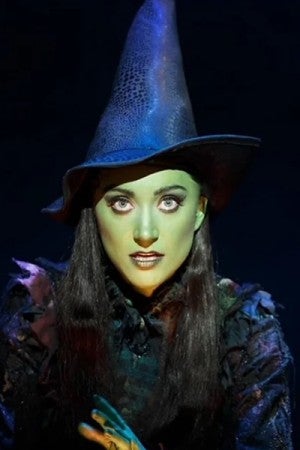
Laurel Harris as Elphaba. Photo by Joan Marcus.
Two pivotal experiences inspired Laurel Harris (IAC 01, AS 02) to pursue a career in musical theatre: Attending Interlochen Arts Camp, and seeing Idina Menzel star as Elphaba in Wicked.
“As soon as [Menzel] finished singing ‘Defying Gravity’ and the curtain came down, I couldn’t move: I was just sobbing,” Harris recalls. “I called my mom and I told her, ‘I have to pursue this career. I just have to try.’ I certainly didn’t think I would ever be in Wicked, and I certainly didn’t think I’d ever have the opportunity to play Elphaba.”
In 2010, Harris joined the second national tour cast of Wicked as the understudy for both Elphaba and Nessarose. On Easter Sunday 2011, she got the call to step into the role of Elphaba for the first time. While making her Elphaba debut was memorable in its own right, Harris’s experience was made even more meaningful by a chance encounter with a stranger.
“I was at church singing the Hallelujah Chorus, and I got all these panicked texts from my stage manager saying, ‘Where are you? You’re on. It’s your Elphaba debut,’” Harris says. “I had been singing next to this woman, and she said to me, ‘You have such a beautiful voice. What are you doing in Eugene, Oregon?’ And I said, ‘I’m Laurel, I’m here with Wicked, and I just found out I’m going on as Elphaba for the first time.’”
Harris’s choir-mate offered to drive her to the theatre. While riding in the woman’s car, Harris called her mother to share the exciting news.
“Before I even told her I was making my debut, my mom said, ‘I’m so sorry to tell you this, but your aunt Cathy passed away this morning,’” Harris says. “I was so sad. When I got to the theatre, I said to the woman, ‘Thank you so much for dropping me off. You’re such a kind soul, and I didn’t even get your name.’ And she said, ‘My name is Cathy.’ At that moment, I was like, ‘Oh wow, Aunt Cathy is with me.’ The whole day, I felt that [my aunt] was with me, and I wasn’t nervous anymore. I was just excited.”
Harris went on to play the role of Elphaba for both Sunday shows, as well as for the next week. In 2012, she left the national tour to make her Broadway debut in the revival of Evita starring Ricky Martin. But although Harris has since appeared in three other Broadway shows—In Transit, Beautiful: The Carole King Musical, and Jagged Little Pill—she keeps coming back to Wicked. Her credits with the show include Elphaba standby for the first national tour (2012); Elphaba for the second national tour (2013); and Elphaba standby on Broadway (2019-20, 2023). She spent the 2023-24 season as the Elphaba standby for the national tour, and will rejoin the Broadway cast in July 2024 as Elphaba standby.
“I always say ‘yes’ to Wicked because it's been so good to me,” Harris says. “It’s the show I’ve grown closest to. I’ve been lucky enough to do four other Broadway shows, but it’s always nice to come back after some time away and have that perspective of life outside of Wicked. Every time I come back, I feel even closer to the character because I’ve grown and changed from doing other shows and experiencing life. It always feels like coming home any time I walk into the Gershwin Theatre, go on tour, or hear that first downbeat.”
Harris’s most memorable performances are a collection of firsts: Her first time playing Elphaba, her first show as Elphaba on Broadway, and her first performance as the full-time Elphaba for the second national tour. Her first show after becoming a mother was also particularly poignant, unlocking a new depth to her portrayal of Elphaba.
“I had dedicated my entire spirit—my everything—to this child, but in the process, I had neglected the artistic part of myself,” Harris says. “Being able to access my artistry is really important to me, and is a way that I’m able to express myself. At that moment, I realized, ‘Okay, I can have a kid, and I can still play Elphaba. She’s still there.’ Now, I feel even more connected to the character in a way that I didn’t even think was possible.”
Harris attributes the show’s longevity to both its enduring themes and the passion of the theatre professionals who are part of the Wicked team.
“The Wizard of Oz is a story we all know and love,” Harris says. “The whole story of the Wizard is always topical, and it morphs with the times depending on who is in positions of leadership in our world. Wicked is a timeless story of love and friendship. Love will always prevail, and I think that's something we need to be reminded of a lot, especially in a world that is quite tumultuous. The show also focuses on celebrating one's individuality, and reminds us that what makes us different is what makes us each so special.”
“I’ve been a part of a lot of shows, and I haven’t seen a show that is run as well as Wicked,” Harris continues. “I think that’s a huge testament to the producing team and to the artistic team. They really care, and they are very much present in the daily running of the show. They’re always making sure that we are continuing to ask the questions, continuing to communicate with each other, and really acting and reacting to each other: going back to the basics and keeping it raw, emotional, and truthful—which is the essence of acting.”
Jaime Rosenstein - Nessarose, National Tour, 2013-14
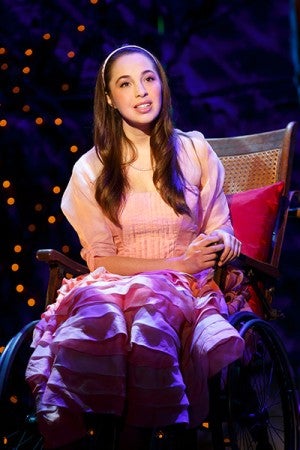
Jaime Rosenstein as Nessarose. Photo by Joan Marcus.
For the most part, Jaime Rosenstein’s (IAC 04) tenure as Nessarose on the national tour of Wicked was a dream come true. But there’s one moment that haunts her.
“One time, I managed to fall out of the wheelchair during ‘Dancing Through Life’,” Rosenstein recalls. “Don't ask me how that happened—I still don't really know. It has given me nightmares.”
The fall wasn’t Rosenstein’s only mishap with Nessarose’s wheelchair.
“In the first act, Nessa's chair spins out of control, and that's when we realize Elphaba's powers,” Rosenstein explains. “I'm supposed to click a latch on my chair that gives the operators control of the chair to make it spin around, but for some reason when I clicked the latch, it froze. I just sat there while the chair was supposed to be spinning. I have never seen a more stunned group of cast members trying to hold back laughter while I waved my arms around and screamed my head off to make it seem like something was happening to me.”
While these two misadventures were perhaps the most memorable moments, Rosenstein’s favorite part of touring with Wicked was bringing joy to the production’s fans.
“I just loved seeing all of the little girls in the audience—some of them even dressed up in costumes—rush to their feet as the show finished,” she says. “For two and a half hours, they could put aside a bad grade on a math test or the mean kids at school and just immerse themselves in the magical world of Wicked. To be able to give anyone that escape is an incredible gift, and I feel so fortunate to have been a part of this show.”
Beyond its enchanted setting, Rosenstein believes Wicked has endured as a result of two powerful themes: friendship and feminism.
“I think Wicked continues to resonate with audiences because it tells the story of true friendship, and that is a theme that will always remain present in audiences’ hearts,” she says. “Over the course of the story, we see these two women change and grow together and just as they evolve as people, so does their friendship.”
“Glinda and Elphaba fight for what is right—they fight to be heard by authority that wants to hold them back,” Rosenstein continues. “As women all over the world continue to fight for their power and for their autonomy today, we need to see strong examples of this on stage and screen.”
Carla Stickler - Elphaba understudy, Broadway and National Tour
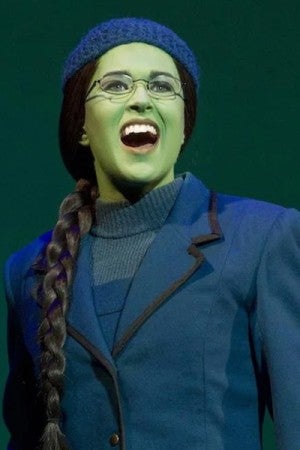
Carla Stickler as Elphaba. Photo by Joan Marcus.
In January 2022, software engineer Carla Stickler (IAC 97-00, IAA 00-01) made national headlines when she was called up to play Elphaba on Broadway—nearly seven years after she’d last played the role.
“To say it was an incredible moment would be an understatement,” Stickler wrote in an Instagram post after the performance. “I’m so overjoyed to have performed with this amazing cast and crew.”
Stickler herself was once a full-time member of the Wicked cast: She served as the standby for Elphaba on the national tour for three years before joining the Broadway cast as the understudy for Elphaba in 2013. In 2015, burned out and concerned about her body’s ability to sustain a long-term musical theatre career, Stickler hung up her black hat and broomstick.
“There is this pressure,” Stickler said in a 2022 interview with Crescendo. “You have this little Elphaba on your shoulder, and you never know when you’re going to have to perform one of the hardest roles on Broadway.”
Although Stickler pivoted to a full-time career in technology, she remained on call as an emergency cover for Wicked. Over the next six years, Stickler was called up many times—although always as a member of the ensemble. Then, on Jan. 1, 2022, Stickler returned to the stage of Broadway’s Gershwin Theatre as Elphaba.
While the performance was a memorable moment for Stickler, she was surprised by the media’s interest in her return to the spotlight.
“As an understudy, I’ve never gotten this kind of attention,” she told Crescendo. “Your job is to make sure the show goes on and there isn’t a big fuss about it.”
The New Year’s Day performance was also a chance for Stickler to find closure and reflect on her experience as part of Wicked.
“Every time I’ve been able to step away and then pop back into this show, having had space to breathe and process, I’ve been able to fully grasp the beauty and magic of getting to be a part of something so magical,” Stickler wrote in her Instagram post. “If I never performed again, I could rest easy knowing that something out-of-this-world happened last night.”
Sheila Karls - ShenShen and Madame Morrible understudy, First National Tour, 2013-15
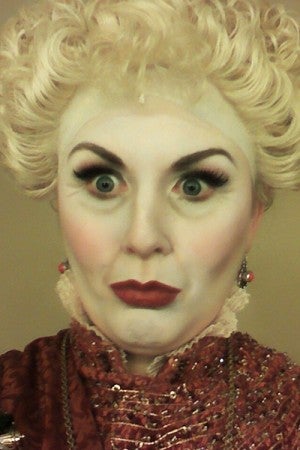
Sheila Karls in costume as Madame Morrible.
Sheila Karls’ (IAC 02, IAA 02-04) experience as a member of Wicked’s first national tour had its share of highs and lows–both literally and figuratively.
“There are so many special memories: from holding curtain and hunkering down in the basement–in costume–because of a sudden tornado in Omaha, Nebraska to breathing from a tiny offstage oxygen machine while dancing at Colorado altitudes,” Karls recalls.
Like Rosenstein, Karls's favorite memories include participating in hilarious, quick-thinking improvisations when technical difficulties arose.
“When the hydraulic lift that propels Elphaba malfunctioned, we did what was loosely known as ‘Plan B’: If Elphaba doesn’t rise, everyone else has to make it look like she does,” Karls says. “‘Plan B’ was either to hit the ground or crouch way down, giving the illusion that Elphaba is soaring above us as we sang to her.”
“You’d never know when to expect it, but when it happened, it was the fastest transition your brain ever had to make. We all suddenly attempted to maintain the illusion for the audience, belting out our respective notes while belly-flopping on the floor and trying to keep from laughing at how ridiculous some of our costumes must look horizontally. But the show must go on!”
There were difficult moments too, when words of “For Good” offered as much catharsis for the performers as they did for the audience.
“A forever emblazoned, bittersweet memory was when we learned at the half-hour pre-show call that one of our very dear castmates had finally lost her battle with cancer,” Karls says. “I have no doubt that it was the most difficult performance of any of our lives, but we did it for her, with conviction, through veiled tears, through lyrics imbued with particularly special meaning that day: ‘Because I knew you, I have been changed for good.’ Our company held a framed picture of her, giving her the final bow thereafter until our tour closed.”
Karls believes that raw emotion–woven into the book and lyrics and brought to life by dedicated casts and crews–is the reason Wicked has become one of the most popular musicals of all time.
“The show’s got heart,” Karls said. “Its universally relatable themes–wanting to belong, perseverance amidst hate, and ultimately, self-acceptance and self-love–resonate with the incredibly personal, human part in all of us.”
“Experiencing the iconic moment when Elphaba finally takes flight is, I think, one of the most exhilarating moments in musical theatre,” she continues. “It’s when resilience meets a new willingness. It’s when empowerment literally rises above all other voices into the unknown ‘western sky.’ Of course, the wildly unique choreography, score, and beautifully elaborate costumes further drive these points home.”
“It’s truly a creative spectacle that asks the questions our souls want us to ask.”
